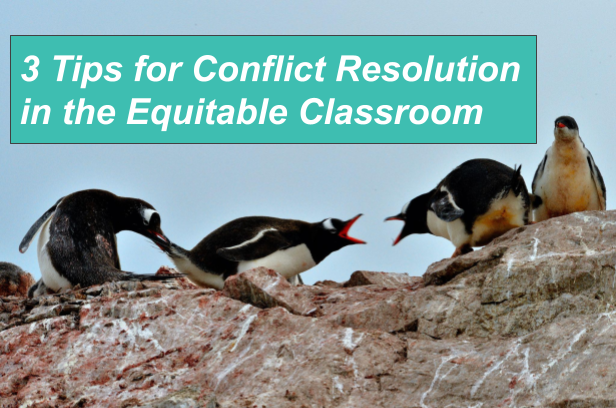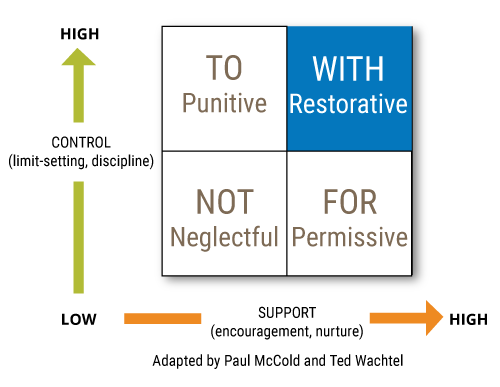3 Tips for Conflict Resolution in the Equitable Classroom

As we work toward increasing equity in our classrooms, two things are likely to occur: First, more of our students will feel comfortable and confident enough to speak up and share their voices. And second, the increase in voices shared will inevitably lead to an increase in differences of opinion and even conflict1. This is a natural and healthy outcome of an equitable classroom. After all, a classroom where students agree on everything is likely to feel pretty stale.
Conflict can make us feel uneasy, though. Most of us understandably try to shy away from it. Instead, let’s prepare for it! Let’s make sure we’re teaching and modeling the necessary skills for resolving conflict in a way that makes everyone feel whole. Here are three tips for conflict resolution in the equitable classroom.
Model and Encourage “I” Statements
This tip comes to us from The International Institute for Restorative Practices (IIRP)2. When we’re in conflict with another person, we often want to attribute our own negative feelings to the other person, i.e. “You made me angry!” A more helpful (and accurate!) way of expressing our emotions might be something like, “I felt angry when you laughed at my suggestion.” This way of speaking accomplishes at least two worthwhile goals:
- First, we are clearly accepting ownership of our own emotions, which is a healthy and empowering habit to get into.
- Second, we make it more likely that the other person accepts responsibility for their part in the conflict. The “You made me angry!” statement could easily lead to an argument over the person’s intentions when they laughed, leading us further away from a resolution to the conflict.
It is much easier to resolve a conflict when both parties accept responsibility for their own part in it. “I” statements can help lead us toward that acceptance - so let’s model and encourage them every chance we can.
Remember the Social Discipline Window
Many well-intentioned teachers have created a classroom environment that centered on control - exercising restraint or directing influence over others - OR support - nurturing, encouraging or assisting others.
Let’s all remember the Social Discipline Window3, which reminds us that both control AND support are necessary. High control with low support (such as giving zeros for late assignments even when there are extenuating circumstances) can feel punitive to our students. Conversely, high support with low control (such as giving full credit for homework that was copied from the answer key) feels permissive. The sweet spot is a large dose of both (such as offering homework help to students as a way to earn credit for missing assignments). Our students need boundaries and high expectations. They also need care and encouragement.

These kinds of high control, high support environments set our students up for success when resolving conflicts because they know the norms and expectations and feel supported when they stumble. Periodically, let’s all pause and evaluate where our classroom environments fall within the Social Discipline Window.
Set Aside Extra Time
Okay, we know you don’t have extra time. The tip here is to set aside 10-15% more time for a group activity than you expect it to take. Many of our missteps when resolving conflict in our classrooms is due to our desire for a quick resolution. We have things to get done! We have exciting math to teach! Scheduling a few extra minutes for a group activity is a way of planning for the inevitability of conflict. We can then facilitate its resolution with a level head. Specifically, within the math classroom, this may entail shaving off a practice problem or two from our assignments to ensure we have the necessary time. And let’s all remember, time spent resolving conflict is time well spent. It is one of the life skills that we know will lead to long term flourishing for our students.
Pete Grostic, Ph.D
Executive Director
Please join Math Medic Foundation in our mission to improve math outcomes for all. You can contact us to get involved or donate here.
Follow us on Twitter!
1 Causes and management of school related conflict (Isabu)
2 International Institute for Restorative Practices
3 In Pursuit of Paradigm: A Theory of Restorative Justice (Paul McCold & Ted Wachtel)
10/02/2023